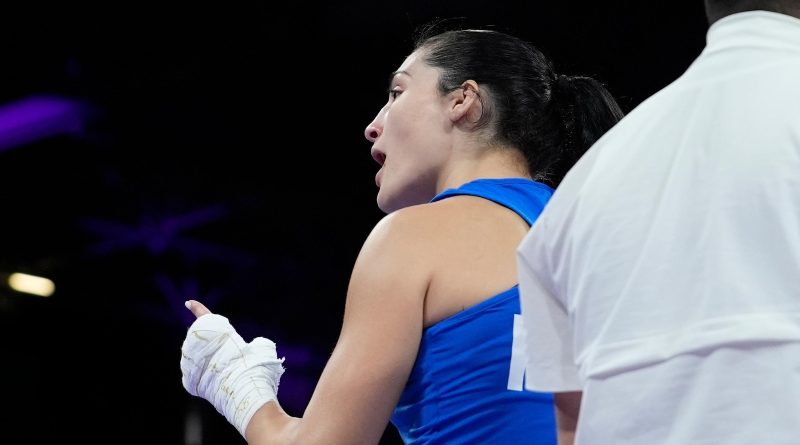Backlash against LGBTQ+ and women athletes grows as female boxer Imane Khelif faces vitriol
PARIS — Members of the LGBTQ+ community, including athletes, officials, and observers, have raised concerns about a flood of derogatory remarks misidentifying female boxer Imane Khelif at the Paris Olympics as transgender or male, which could present risks for LGBTQ+ individuals and female athletes.
Concerns have emerged following criticism from prominent figures like former U.S. President Donald Trump and “Harry Potter” author J.K. Rowling towards the Algerian boxer after her Italian opponent Angela Carini withdrew from their match on Thursday. False claims on social media suggested that Khelif was a male fighting against a female.
These comments have spread across social media platforms, dragging Khelif and Taiwanese boxer Lin Yu-Ting into a broader social debate about women in sports.
On Friday, International Olympic Committee spokesperson Mark Adams stated that Khelif “was born female, was registered as female, lived her life as a female, competed as a female, and holds a female passport.”
He cautioned against “turning this into a witch hunt.”
Some athletes and LGBTQ+ observers are concerned that malicious comments from critics, combined with the IOC’s failure to address a broader global conversation prior to the Olympics, have already begun to demonize transgender, nonbinary, and other LGBTQ+ individuals at an event that promotes inclusivity. This occurs as evolving interpretations of gender identity have sparked a heated political debate, often centered around sports.
Although the Paris Olympics have emphasized a commitment to openness and a record number of 193 openly LGBTQ+ athletes are participating, a segment featuring drag queens during the opening ceremony faced severe backlash from conservative religious groups and others who claimed it mocked Leonardo da Vinci’s “Last Supper.” Some performers and the artistic director of the opening ceremony have reported receiving threats.
Nikki Hiltz, a top middle-distance runner representing the U.S. Olympic team, has personally experienced such derogatory comments. Assigned female at birth, Hiltz identifies as nonbinary.
Hiltz wrote on Instagram in response to the boxing controversy, “Transphobia is rampant at these Olympics. Anti-trans rhetoric is anti-woman. These individuals aren’t ‘protecting women’s sport,’ they are enforcing strict gender norms, targeting and vilifying anyone who doesn’t conform to those norms.”
The controversy stems from assertions by the International Boxing Association that Khelif and Lin did not meet unspecified and opaque eligibility criteria for women’s competition, a decision denounced by the IOC as “a sudden and arbitrary ruling” from a governing body banned from the Olympics since 2019.
While certain sports have specific guidelines regarding transgender athletes and hormone levels in competitions, boxing adheres to rules dating back to the 2016 Olympics, which state that an athlete’s passport determines eligibility, amid a growing rift between the IBA and the IOC.
Adams from the IOC criticized the IBA’s “arbitrary decision,” emphasizing that the attacks on Khelif and Lin are baseless, misogynistic, and pose a threat of spreading misinformation.
Athletes have reportedly faced “numerous instances of online aggression,” according to Adams from the IOC, who asserted that it is the Olympic body’s duty to ensure the safety and well-being of the athletes.
However, figures like Cyd Zeigler, co-founder of Outsports, a platform tracking LGBTQ+ participation in the Olympics, argue that the IOC’s failure to provide clarity before the Games has harmed both female athletes and LGBTQ+ competitors, who have long fought for acknowledgment.
Zeigler emphasized that the issue lies not with the athletes but with the policymakers. He lamented the recent vitriol directed at these athletes.
Zeigler expressed concerns that the backlash is likely to deter LGBTQ+ individuals from participating in future Games, despite activists acknowledging significant progress made by the Olympics in recent years.
“By attempting to suppress the anticipated dialogue, transphobic individuals steer the conversation,” Zeigler stated. “We can engage in discussions about the inclusion of trans athletes. There are constructive dialogues to be had. It’s the vitriol, the nasty, abhorrent, graphic language used in these situations that troubles me.”
Former athletes like Charline Van Snick of Belgium, a former judo medalist in the 2012 Games, expressed dismay over the testing and comments regarding Khelif and Hamori’s bodies, which they believe are undoing years of progress made by female athletes to combat stigma.
While acknowledging significant advancements, Ilona Maher, a star of the U.S. women’s rugby team, broke down in tears in a social media post prior to the Olympics following comments questioning her gender.
Van Snick remarked, “There are women with varying levels of testosterone or different body types. In judo, you must maintain a feminine identity, as per societal norms. If you deviate too much from that, you’re labeled as male. But I am a woman who can outperform men in the sport.”
——
Associated Press videojournalist Lujain Jo contributed from Paris.

